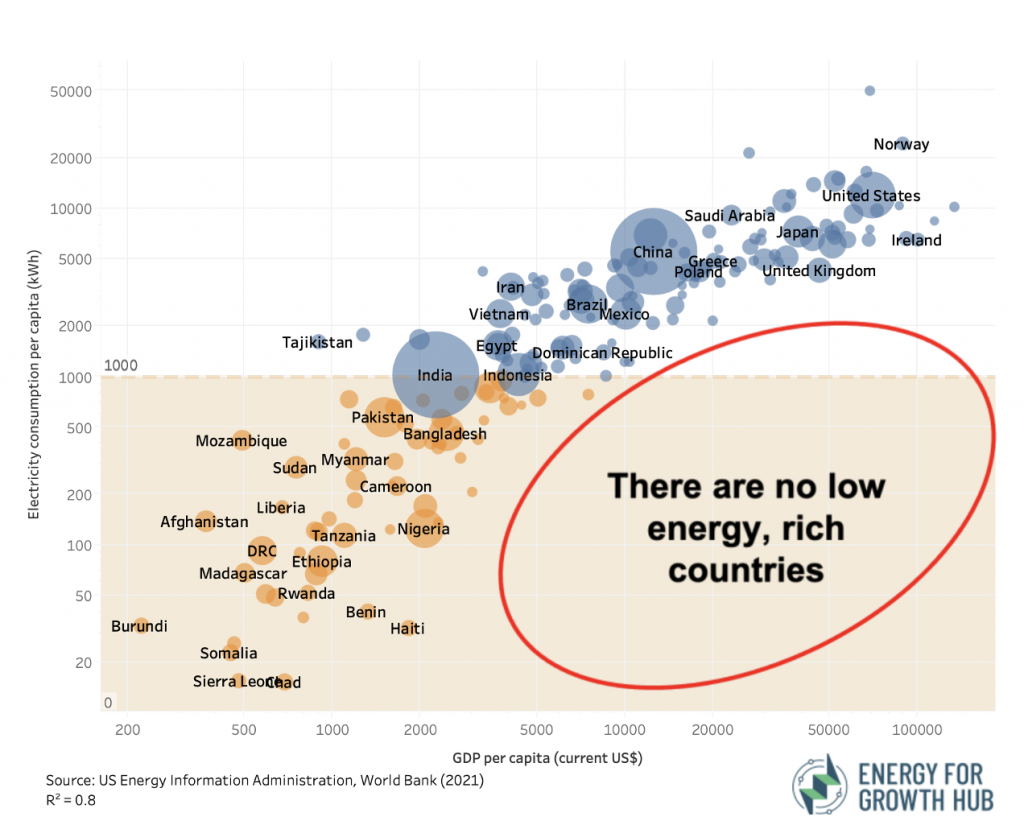The positive relationship between energy and economic growth is clear: income and energy consumption are tightly correlated on every continent and across every time period for which data exists. Nowhere in the world is there a wealthy country that consumes only a little energy, nor a poor country that consumes a lot.
FIGURE 1: Electricity consumption vs GDP per capita, 2021

But is this a result of energy-inducing economic growth or of wealthier people simply demanding more services that require energy? It’s likely both. Yet since energy is an input for almost all economic activity, we can safely conclude that the quality and cost of its provision will greatly impact economic output. While causality logically runs both ways, mounting evidence suggests energy consumption is a necessary enabler – and driver – of economic growth.
The Evidence
While rural residential electrification does not appear to have meaningful impacts on household incomes among the extreme poor,1 growing literature links reliable, low-cost energy for firms with:
- Productivity. Energy is a fundamental input to economic activity, and African firms identify poor infrastructure, especially power, as a leading constraint to productivity and expansion.2 This is most often established by examining the relationship of firm productivity to electrical outages.3
- Profitability. Country studies on the impact of power outages showed significant negative effects on productivity in Zambia, production costs in Ethiopia, SME sales in Senegal, and revenues and producer surplus in India. Further, the increased cost of electricity is shown to decrease profit margins of small and medium-sized businesses.4
- Job creation. Electricity shortages were found to reduce the likelihood of an individual being employed in a high skilled job by 35-41% and of being self-employed by 32-47%.5
- Macroeconomic growth. While studies show microeconomic effects on firms, the cumulative macroeconomic impact is also well established by studies examining how investments in energy infrastructure affect GDP and measures of human capital.6
Salience: A low-energy future is a jobless future.
Employment is a top priority for nearly every government, especially in markets with large underemployed youth populations. Relieving the electricity constraint on job creation is thus critical for both countries and the world. Nigeria alone will have a population larger than the United States by around 2045 — but is on track for only 2 percent of America’s electricity generation capacity. If millions of young Africans and their families are to escape poverty and have a more stable and prosperous future, the challenges of large-scale power must be solved.
Endnotes
- Lee, Kenneth, Edward Miguel, & Catherine Wolfram, “Does Household Electrification Supercharge Economic Development?” Journal of Economic Perspectives, 2020.
- Ramachandran, Vijaya et al., “Africa’s Private Sector: What’s Wrong with the Business Environment and What to Do About It,” Center for Global Development, 2009.
- Abotsi, Anselem Komla, “Power Outages and Production Efficiency of Firms in Africa,” International Journal of Energy Economics and Policy, 2016; Allcott, Hunt, Allan Collard-Wexler, & Stephen D. O’Connell, “How Do Electricity Shortages Affect Industry? Evidence from India.” American Economic Review, 106 (3): 587-624, 2016.; See also: Kassem, Dana, Does Electrification Cause Industrial Development? Grid Expansion and Firm Turnover in Indonesia,” CRC TR Working Paper, 2021.
- Sichone, Yimbilanji et al., “Electricity load shedding: An econometric analysis of the productivity of firms in the manufacturing sector in Lusaka,” International Journal of Commerce and Management Research, 2016; Tariku, Lamessa, “Power Outages, Its Economic Cost and Firm Performance: Evidence From Ethiopia,” University of Milan, 2018; Cissokho, Lassana & Abdoulaye Seck, “Electric Power Outages and the Productivity of Small and Medium Enterprises in Senegal,” Investment Climate and Business Environment Research Fund, 2013.; Owusu, D., Agyemang, P. O., & Agyeman, D. O., Electricity Energy Access and Profitability of Micro and Small Enterprises in Ghana. Journal of Entrepreneurship and Innovation in Emerging Economies, 8(1), 46–59, 2022.
- Mensah, Justice, “Jobs! Electricity Shortages and Unemployment in Africa,” World Bank Policy Research Working Paper, 2018.; Lambert, R. J., & Silva, P. P., “The challenges of determining the employment effects of renewable energy,” Renewable and Sustainable Energy Reviews, 16(7), 4667-4674, 2012; E Canning, D., & Bennathan, E., “The social rate of return on infrastructure investments,” World Bank Policy Research Working Paper 2390, 2020.
- Fried, Stephie & David Lagakos, “The role of energy capital in accounting for Africa’s recent growth resurgence,” International Growth Centre, 2017.; Straub, Stéphane, “Infrastructure and Growth in Developing Countries: Recent Advances and Research Challenges,” World Bank Policy Research Working Paper 4460, 2016.
- Dinkelman, Taryn, “The Effects of Rural Electrification on Employment: New Evidence from South Africa,” American Economic Association, 2011.


